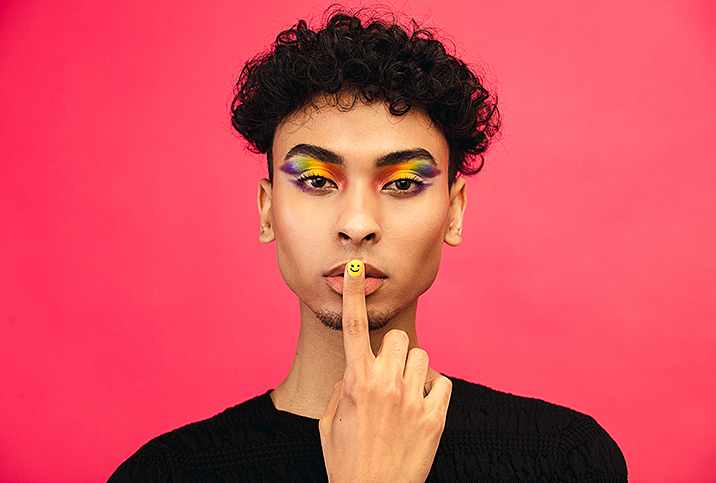What Does It Actually Mean to Be Sex-Positive?

You might have heard the term "sex-positive" floating around on social media, but it's OK if you aren't sure what it means or if it applies to you. The term represents both specific attitudes and beliefs about sexual expression and a historic movement to help reduce societal stigmas and shame surrounding sex, as California-based clinical psychologist and certified sex therapist Kelifern Pomeranz, Psy.D., CST, explained.
Are you sex-positive?
"To be sex-positive is to hold the belief that safe and consensual self or partnered sexual activities are a healthy and natural part of the human experience, and these behaviors should never be sources of guilt, shame, fear or regret," Pomeranz said.
These beliefs extend to all expressions of gender and sexuality, prioritizing a commitment to making empowered sexual decisions, the expectation of enthusiastic consent, and mutual respect and open communication for and with your partners at all times.
What are the origins of sex-positivity?
While the idea behind sex-positivity is relatively simple and straightforward, in practice, it's a reaction to deeply restrictive cultural, religious and political viewpoints that have been in place and evolved over time. These factors make the idea of sex-positivity feel new and radical to some as it reaches new audiences on social media.
"The term 'sex-positive' was coined in the late 1990s, but what our culture is experiencing is simply the latest chapter in a series of sexual revolutions that go back more than a century," Pomeranz said. "Most of us are familiar with the free love movement of the 1960s, but before that there was [psychoanalyst Wilhelm Reich]'s work in the 1920s, and—even earlier—there was a loosening of conservative sexual views in the late Victorian era. One could even argue sex positivity is more the historical norm than something newly invented, illustrated by the recent discovery of 37,000-year-old pornographic cave drawings."
Former Playboy model Jessica Hall opens up about the stigma of posing nude for the magazine. Watch the full interview here.
So many misconceptions...
As mentioned above, Pomeranz notes, "There are many misperceptions about what it means to be sex-positive." For example, she continues, "Being sex-positive does not necessarily mean that a person is promiscuous, kinky, queer, nonmonogamous, without boundaries or even sexually confident."
In fact, you don't even have to have any sexual experience to be sex-positive—all it takes is celebrating both your right and others' right to sexual agency, freedom, choice, and safe and consensual expression.
In contrast, sex-negative attitudes include shaming or judging others about their sexual behaviors or even nonsexual behaviors, including:
- What they choose to wear.
- Judgment or violence toward sex workers and/or marginalized identities, the LGBTQIA+ community and people of color.
- Promoting abstinence-only sex education or education that centers on heterosexual relationships.
- Slut-shaming and victim-blaming.
With so many people from all walks of life brought up ingrained with certain cultural norms, expectations and beliefs surrounding sex and sexual expression, it's easy to have negative attitudes about sex without even realizing it.
Additionally, your own experiences with sexual expression could shape your current beliefs, especially if you experienced shame or stigma, or if you're a survivor of physical or emotional trauma.
"Your sexual beliefs or behaviors might be sex-negative if they cause fear, guilt, shame, embarrassment or distress," Pomeranz added.
How to embrace a sex-positive attitude
Embodying a sex-positive attitude or lifestyle doesn't mean you have to step wildly out of your comfort zone—in fact, the whole point is to find out what you do like and embrace it, while getting rid of any expectations to do things you don't want to do.
"You don't have to rush straight out to a dungeon to enhance your sexual knowledge and nourish your curiosity—although that could be fun," Pomeranz said. "Look for sex-positive books and podcasts. There is abundant information online, but make sure you trust the source. You might also consider working with a trained sex-positive professional, such as a therapist, who can help you work through any shame, stigma and cultural or religious blocks, and help you explore what healthy sexuality looks like for you."
While therapy should always remain a judgment-free zone, Pomeranz recommends specifically seeking out a therapist certified by the American Association of Sexuality Educators, Counselors and Therapists (AASECT).
"AASECT-certified sex therapists and educators are specially trained to promote the understanding of human sexuality and healthy sexual behavior," Pomeranz said.
No matter what your journey looks like, you may feel extremely vulnerable when exploring your feelings and desires—especially with others—so being gentle with yourself is the most important starting point. You deserve pleasure and joy without shame, fear or guilt, and it's OK if the process of discovery is ongoing. Unlearning a lifetime's worth of beliefs takes time, but it's so worth it to improve your overall physical and emotional well-being and happiness.


















